-
 Bitcoin
Bitcoin $113000
-1.26% -
 Ethereum
Ethereum $3435
-3.79% -
 XRP
XRP $2.836
-5.53% -
 Tether USDt
Tether USDt $0.9997
0.00% -
 BNB
BNB $746.1
-1.80% -
 Solana
Solana $160.4
-3.48% -
 USDC
USDC $0.9997
0.00% -
 TRON
TRON $0.3206
-1.47% -
 Dogecoin
Dogecoin $0.1936
-6.02% -
 Cardano
Cardano $0.6980
-3.36% -
 Hyperliquid
Hyperliquid $37.28
-2.82% -
 Sui
Sui $3.340
-5.59% -
 Stellar
Stellar $0.3695
-5.87% -
 Chainlink
Chainlink $15.70
-3.74% -
 Bitcoin Cash
Bitcoin Cash $529.2
-2.94% -
 Hedera
Hedera $0.2304
-6.83% -
 Avalanche
Avalanche $21.00
-3.13% -
 Toncoin
Toncoin $3.620
0.53% -
 Ethena USDe
Ethena USDe $1.000
-0.01% -
 UNUS SED LEO
UNUS SED LEO $8.959
0.11% -
 Litecoin
Litecoin $105.0
-0.05% -
 Shiba Inu
Shiba Inu $0.00001185
-2.58% -
 Polkadot
Polkadot $3.495
-2.45% -
 Uniswap
Uniswap $8.808
-2.07% -
 Monero
Monero $292.9
-2.80% -
 Dai
Dai $0.9998
-0.01% -
 Bitget Token
Bitget Token $4.258
-1.43% -
 Pepe
Pepe $0.00001006
-4.02% -
 Cronos
Cronos $0.1273
-5.20% -
 Aave
Aave $250.1
-2.39%
Why is a Bitcoin ETF called "a bridge from traditional financial markets to cryptocurrencies"?
Bitcoin ETFs bridge traditional finance and crypto by offering accessibility, simplification, regulatory acceptance, liquidity, risk management tools, and institutional investment opportunities.
Apr 09, 2025 at 08:57 pm
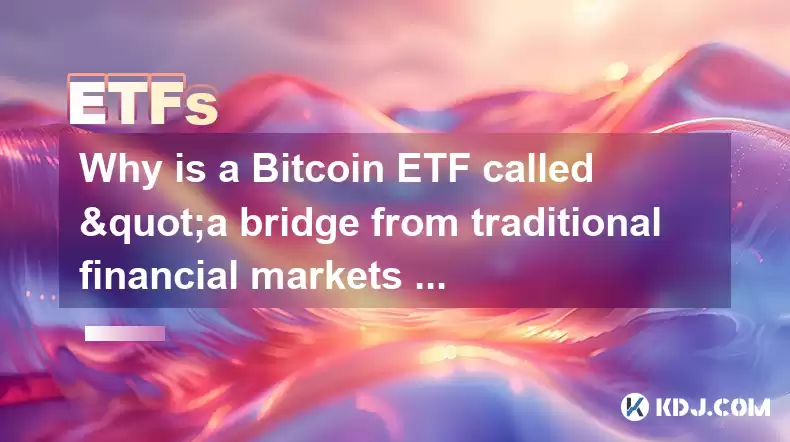
A Bitcoin Exchange Traded Fund (ETF) is often referred to as "a bridge from traditional financial markets to cryptocurrencies" due to its unique position in facilitating the integration of these two distinct financial ecosystems. This article will delve into the reasons behind this designation, exploring how Bitcoin ETFs serve as a crucial link between the established world of traditional finance and the burgeoning realm of digital currencies.
Accessibility for Traditional Investors
One of the primary reasons a Bitcoin ETF is considered a bridge is its ability to make cryptocurrencies more accessible to traditional investors. Traditional investors are often accustomed to trading stocks, bonds, and other conventional financial instruments through established brokerage accounts. A Bitcoin ETF allows these investors to gain exposure to Bitcoin without the need to directly purchase and manage the cryptocurrency themselves.
- Invest through familiar platforms: Investors can buy shares of a Bitcoin ETF through their existing brokerage accounts, just as they would with any other stock or ETF.
- Avoid complexities of crypto exchanges: By investing in a Bitcoin ETF, investors bypass the need to navigate cryptocurrency exchanges, which can be daunting for those unfamiliar with digital assets.
- Regulatory oversight: Bitcoin ETFs are subject to regulatory oversight, providing an additional layer of security and trust for traditional investors who are accustomed to regulated financial products.
Simplifying Investment in Cryptocurrencies
Bitcoin ETFs simplify the process of investing in cryptocurrencies, making it more appealing to a broader audience. Simplification is key in bridging the gap between traditional finance and the crypto world.
- No need for crypto wallets: Investors do not need to set up and manage cryptocurrency wallets, which can be a barrier for those new to digital assets.
- Eliminate technical barriers: The technical aspects of buying, storing, and securing Bitcoin are handled by the ETF issuer, reducing the learning curve for investors.
- Diversification: Investors can easily diversify their portfolios by adding Bitcoin exposure through an ETF, without the need to allocate a significant portion of their assets to a single cryptocurrency.
Regulatory Acceptance and Legitimacy
The introduction of Bitcoin ETFs has been a significant step towards the regulatory acceptance and legitimacy of cryptocurrencies within traditional financial markets. This acceptance is crucial in building a bridge between the two worlds.
- SEC approval: The approval of Bitcoin ETFs by regulatory bodies like the U.S. Securities and Exchange Commission (SEC) signals a level of acceptance and legitimacy for cryptocurrencies.
- Institutional involvement: The launch of Bitcoin ETFs often involves major financial institutions, further legitimizing cryptocurrencies in the eyes of traditional investors.
- Increased mainstream adoption: As Bitcoin ETFs gain traction, they contribute to the broader acceptance of cryptocurrencies as a legitimate asset class within traditional finance.
Liquidity and Market Integration
Bitcoin ETFs enhance the liquidity and market integration of cryptocurrencies, making them more compatible with traditional financial markets. This integration is essential for bridging the two ecosystems.
- Increased trading volume: Bitcoin ETFs can attract significant trading volume, increasing the overall liquidity of the cryptocurrency market.
- Price discovery: The trading of Bitcoin ETFs on traditional exchanges contributes to more efficient price discovery, aligning the cryptocurrency market more closely with traditional financial markets.
- Arbitrage opportunities: The existence of Bitcoin ETFs creates arbitrage opportunities between the ETF and the underlying Bitcoin, further integrating the two markets.
Risk Management and Hedging
Bitcoin ETFs provide traditional investors with tools for risk management and hedging, which are familiar concepts in the world of traditional finance. This aspect is crucial in bridging the gap between the two markets.
- Hedging against volatility: Investors can use Bitcoin ETFs to hedge against the volatility of the cryptocurrency market, a strategy commonly employed in traditional finance.
- Portfolio diversification: By including Bitcoin ETFs in their portfolios, investors can diversify their risk exposure, a practice well-established in traditional investment strategies.
- Options and futures: The availability of options and futures contracts on Bitcoin ETFs allows for more sophisticated risk management strategies, further aligning cryptocurrencies with traditional financial instruments.
Institutional Adoption and Investment
The introduction of Bitcoin ETFs has facilitated institutional adoption and investment in cryptocurrencies, a critical factor in bridging the gap between traditional finance and the crypto world.
- Institutional investors: Bitcoin ETFs provide a more palatable entry point for institutional investors, who may have been hesitant to directly invest in cryptocurrencies.
- Asset managers: Asset managers can include Bitcoin ETFs in their offerings, making it easier for their clients to gain exposure to cryptocurrencies.
- Pension funds and endowments: The availability of Bitcoin ETFs opens the door for pension funds and endowments to allocate a portion of their portfolios to cryptocurrencies, further integrating the two markets.
Frequently Asked Questions
Q: How does a Bitcoin ETF differ from directly owning Bitcoin?
A: A Bitcoin ETF differs from directly owning Bitcoin in several ways. When you invest in a Bitcoin ETF, you are buying shares of a fund that holds Bitcoin, rather than the cryptocurrency itself. This means you do not need to manage a cryptocurrency wallet or deal with the technical aspects of buying and securing Bitcoin. Additionally, Bitcoin ETFs are traded on traditional stock exchanges, making them more accessible to investors who are accustomed to trading conventional financial instruments.
Q: Can a Bitcoin ETF be used for long-term investment?
A: Yes, a Bitcoin ETF can be used for long-term investment. Investors who believe in the long-term potential of Bitcoin can hold shares of a Bitcoin ETF as part of their investment strategy. However, it's important to consider the fees associated with the ETF, as well as the overall performance of the fund, when making long-term investment decisions.
Q: Are there any risks associated with investing in a Bitcoin ETF?
A: Yes, there are risks associated with investing in a Bitcoin ETF. These include the volatility of the underlying Bitcoin price, the fees charged by the ETF, and the potential for regulatory changes that could impact the ETF's performance. Additionally, investors should be aware of the counterparty risk associated with the ETF issuer and the custodians holding the Bitcoin.
Q: How does the performance of a Bitcoin ETF compare to directly holding Bitcoin?
A: The performance of a Bitcoin ETF is generally designed to track the price of Bitcoin closely. However, there may be slight deviations due to factors such as fees, trading volume, and the ETF's structure. Over time, the performance of a Bitcoin ETF should be very similar to that of directly holding Bitcoin, but investors should monitor the tracking error to ensure the ETF is meeting its objectives.
Disclaimer:info@kdj.com
The information provided is not trading advice. kdj.com does not assume any responsibility for any investments made based on the information provided in this article. Cryptocurrencies are highly volatile and it is highly recommended that you invest with caution after thorough research!
If you believe that the content used on this website infringes your copyright, please contact us immediately (info@kdj.com) and we will delete it promptly.
- Bitcoin, XRP, and the Price Drop Blues: What's Shakin' in Crypto?
- 2025-08-03 00:30:12
- Cold Wallet, Troncoin, and Shiba Inu: Navigating Crypto Opportunities in the Concrete Jungle
- 2025-08-03 01:51:38
- Crypto Presales: Navigating the Hype with BlockchainFX and Beyond
- 2025-08-03 01:51:39
- Bank of America, Ripple, and RLUSD: A New Era in Digital Finance?
- 2025-08-03 00:30:12
- Bitcoin Strategy: Saylor's Not Hoarding, He's Building an Empire
- 2025-08-02 22:30:12
- Bitcoin Bloodbath: Macro Pressures and Liquidations Unleash Crypto Chaos
- 2025-08-02 22:30:12
Related knowledge
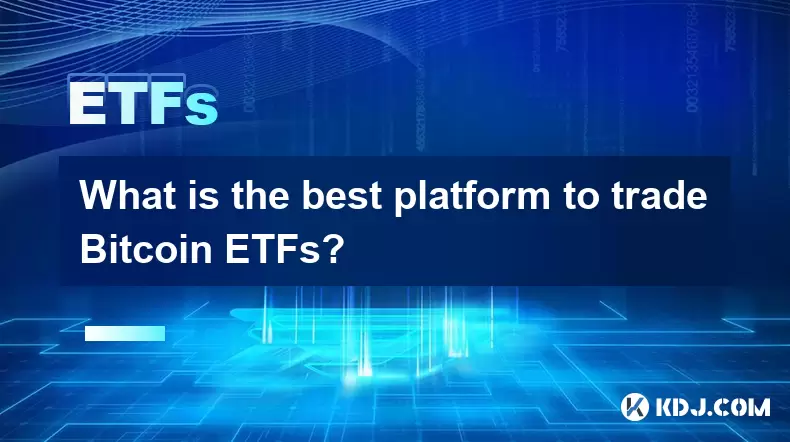
What is the best platform to trade Bitcoin ETFs?
Jul 23,2025 at 04:14am
Understanding Bitcoin ETFs and Their Role in TradingBitcoin Exchange-Traded Funds (ETFs) have gained significant traction among traditional and crypto...

What is the best platform to trade Bitcoin ETFs?
Jul 17,2025 at 03:50pm
Understanding Bitcoin ETFs and Their Role in the MarketBitcoin Exchange-Traded Funds (ETFs) are investment vehicles that track the price of Bitcoin wi...
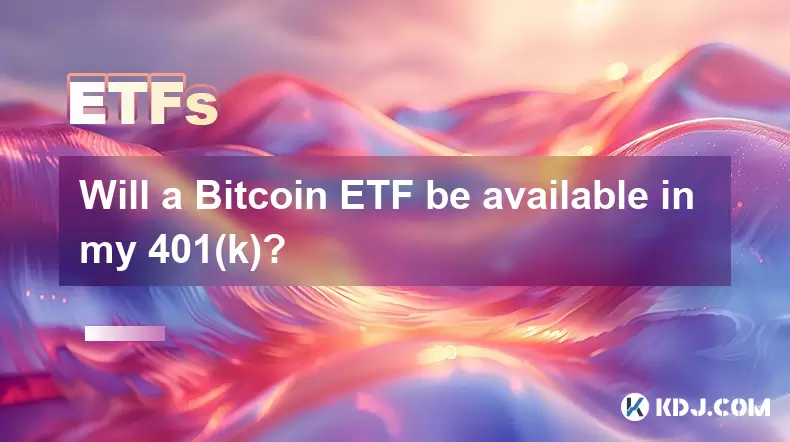
Will a Bitcoin ETF be available in my 401(k)?
Jul 17,2025 at 10:42pm
What is a Bitcoin ETF?A Bitcoin ETF (Exchange-Traded Fund) is an investment vehicle that tracks the price of Bitcoin without requiring investors to di...

Who is the authorized participant for a Bitcoin ETF?
Jul 18,2025 at 12:42am
Understanding the Role of Authorized Participants in Bitcoin ETFsIn the context of Bitcoin Exchange-Traded Funds (ETFs), an authorized participant (AP...
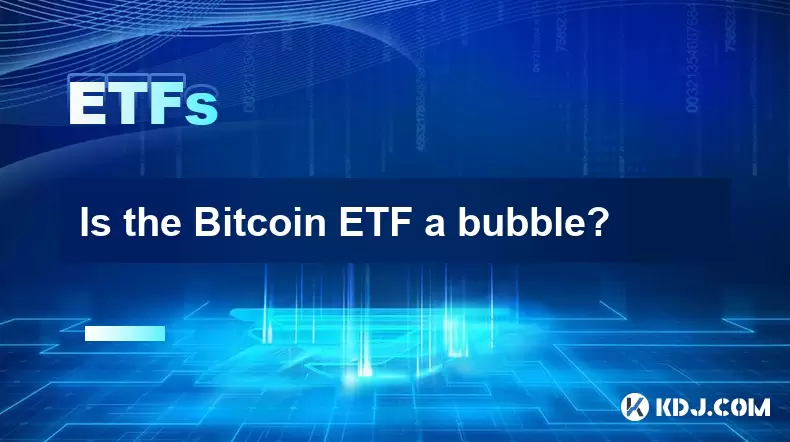
Is the Bitcoin ETF a bubble?
Jul 20,2025 at 06:57am
Understanding the Bitcoin ETF ConceptA Bitcoin Exchange-Traded Fund (ETF) is a financial product that aims to track the price of Bitcoin without requi...
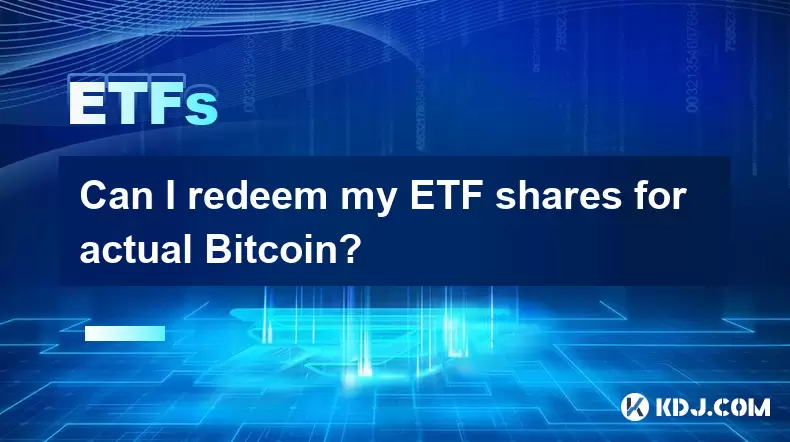
Can I redeem my ETF shares for actual Bitcoin?
Jul 17,2025 at 03:14pm
Understanding ETF Shares and Their Relation to BitcoinExchange-Traded Funds (ETFs) have become a popular investment vehicle for those looking to gain ...

What is the best platform to trade Bitcoin ETFs?
Jul 23,2025 at 04:14am
Understanding Bitcoin ETFs and Their Role in TradingBitcoin Exchange-Traded Funds (ETFs) have gained significant traction among traditional and crypto...

What is the best platform to trade Bitcoin ETFs?
Jul 17,2025 at 03:50pm
Understanding Bitcoin ETFs and Their Role in the MarketBitcoin Exchange-Traded Funds (ETFs) are investment vehicles that track the price of Bitcoin wi...

Will a Bitcoin ETF be available in my 401(k)?
Jul 17,2025 at 10:42pm
What is a Bitcoin ETF?A Bitcoin ETF (Exchange-Traded Fund) is an investment vehicle that tracks the price of Bitcoin without requiring investors to di...

Who is the authorized participant for a Bitcoin ETF?
Jul 18,2025 at 12:42am
Understanding the Role of Authorized Participants in Bitcoin ETFsIn the context of Bitcoin Exchange-Traded Funds (ETFs), an authorized participant (AP...

Is the Bitcoin ETF a bubble?
Jul 20,2025 at 06:57am
Understanding the Bitcoin ETF ConceptA Bitcoin Exchange-Traded Fund (ETF) is a financial product that aims to track the price of Bitcoin without requi...

Can I redeem my ETF shares for actual Bitcoin?
Jul 17,2025 at 03:14pm
Understanding ETF Shares and Their Relation to BitcoinExchange-Traded Funds (ETFs) have become a popular investment vehicle for those looking to gain ...
See all articles

























































































